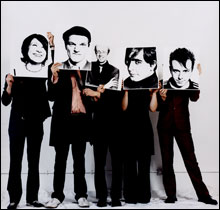 Of the many, many excellent jokes singer Eddie Argos makes on the crackerjack debut by his London-based band Art Brut, the best might be the band’s name itself. “Art brut” is a term coined by the French Pop artist Jean Dubuffet, who used it to describe works made by individuals existing outside the ritualized world of professional art. We call the stuff outsider art, and in its musical form it’s received attention lately through material like the Langley Schools Music Project, in which a group of 1970s elementary-school kids, under the direction of their mad-genius music teacher, recorded elaborately arranged choral versions of such tunes as Barry Manilow’s “Mandy” and the Eagles’ “Desperado.”
Of the many, many excellent jokes singer Eddie Argos makes on the crackerjack debut by his London-based band Art Brut, the best might be the band’s name itself. “Art brut” is a term coined by the French Pop artist Jean Dubuffet, who used it to describe works made by individuals existing outside the ritualized world of professional art. We call the stuff outsider art, and in its musical form it’s received attention lately through material like the Langley Schools Music Project, in which a group of 1970s elementary-school kids, under the direction of their mad-genius music teacher, recorded elaborately arranged choral versions of such tunes as Barry Manilow’s “Mandy” and the Eagles’ “Desperado.”
The joke of Art Brut’s name is that Argos and his mates don’t make outsider art — they make insider art, devilishly funny rock music about rock music. On Bang Bang Rock & Roll (Fierce Panda), Art Brut (who will stop in at the Middle East on April 3) parody the ritualized world of professional music even as they enjoy the payoffs that world has to offer. In this way — and in the way Argos speaks as much as he sings — Art Brut could be considered an English equivalent of the Hold Steady, the Brooklyn indie group whose frontman, Craig Finn, seems determined to become the underground’s self-aware Bruce Springsteen.
Bang Bang opens with “Formed a Band,” which on first hearing seems to mock the chest-beating self-promotion of young rock acts. “Formed a band, we formed a band,” Argos shouts over a choppy guitar riff. “Look at us! We formed a band!” As the song progresses, the claims to greatness keep piling up, from “We’re gonna write a song as universal as ‘Happy Birthday’ ” to “We’re gonna be the band that writes the song that makes Israel and Palestine get along.” Yet for all the joy Argos takes in skewering the kind of self-aggrandizement encouraged by the British music press (which anoints new rock saviors every other week), he’s also seduced by the romance of it. In “My Little Brother,” he describes his sibling’s discovery of rock and roll in language that revisits his own awakening: “He made me a tape of bootlegs and B-sides, and every song — every single song on that tape — said exactly the same thing: ‘Why don’t our parents worry about us?’ ”
In “Emily Kane,” Argos describes in excruciating detail the flame he tends for an old girlfriend. “If memory serves, we’re still on a break,” he admits without a shred of embarrassment. Yet the music is overwhelmingly jubilant, with another one of guitarist Ian Catskilkin’s jagged riffs laid atop a beat that drummer Mikey B can’t seem to play fast enough. Near the end, Argos transcends self-obsession and gives himself over to the music’s emotion. “I hope this song finds you fame,” he sings as a choir of gutter punks pipes up behind him. “I want school kids on buses singing your name!” “Emily Kane” is the definition of meta-rock: Argos solves the problem he’s describing in the song by performing the song.